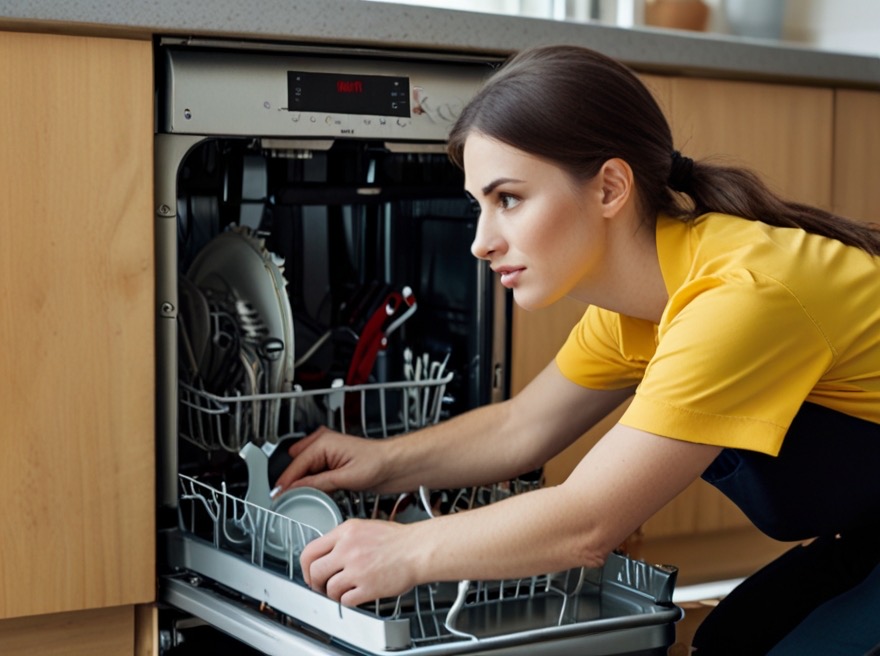A dishwasher is one of those appliances that makes our lives significantly easier. However, to keep it running efficiently, regular cleaning and maintenance are crucial. Whether you own a traditional built-in model, a portable one, or even a countertop version, understanding how to properly care for your dishwasher will not only prolong its lifespan but also ensure that your dishes come out sparkling clean every time.
Cleaning and Maintenance Tips for Built-In Dishwashers
⠀
- Regularly Clean the Filter:
Built-in dishwashers usually come with a filter at the bottom that catches food particles and debris. Over time, this filter can get clogged, leading to reduced cleaning efficiency and unpleasant odors. To clean it, remove the bottom rack to access the filter, twist it out, and rinse it under running water. For stubborn grime, use a soft brush to gently scrub the filter before replacing it.
⠀
- Wipe Down the Door Seals:
The door seals on a built-in dishwasher can accumulate grease, soap scum, and grime, which can lead to unpleasant odors and even mold. Wipe down the seals with a damp cloth or sponge dipped in a mild detergent solution. Ensure that you reach into the crevices where dirt tends to hide.
⠀
- Run a Vinegar Cycle:
Once a month, run an empty cycle with a cup of white vinegar placed in a dishwasher-safe container on the top rack. This helps to break down any lingering grease, sanitize the interior, and eliminate odors. For added freshness, sprinkle a cup of baking soda across the bottom of the dishwasher and run a short cycle.
⠀
- Check the Spray Arms:
Spray arms are responsible for distributing water evenly across your dishes. Over time, they can become clogged with food particles or mineral deposits. Remove the spray arms and use a toothpick or a small brush to clear any blockages. This ensures your dishwasher cleans dishes effectively.
⠀
Maintaining Portable Dishwashers
⠀
- Keep the Exterior Clean:
Portable dishwashers are more exposed to kitchen grime due to their mobility. Regularly wipe down the exterior with a damp cloth and mild detergent to prevent the build-up of grease and dust.
⠀
- Clean the Interior:
Like built-in dishwashers, portable models also need periodic cleaning of their interiors. Follow the same steps clean the filter, wipe down the seals, and run a vinegar cycle. However, because portable dishwashers often have a smaller interior, you may need to clean them more frequently.
⠀
- Ensure Proper Drainage:
Since portable dishwashers connect to your kitchen faucet and drain into the sink, it’s essential to ensure that the drainage hose is not kinked or clogged. Regularly inspect the hose for any signs of wear or blockages that could impede the water flow.
⠀
- Inspect the Wheels:
Portable dishwashers are equipped with wheels for mobility. Over time, these wheels can collect dust, hair, and other debris, making it difficult to move the appliance. Clean the wheels regularly and ensure they are in good condition to avoid damaging your kitchen floor.
⠀
Caring for Countertop Dishwashers
⠀
- Clean the Inlet Screen:
Countertop dishwashers are compact, and because of their size, they often have a small inlet screen that can get clogged with debris. Check the screen regularly and clean it to ensure that water flows freely into the appliance.
⠀
- Regular Descaling:
Due to their size, countertop dishwashers can be more prone to limescale buildup, especially if you live in an area with hard water. Descale the dishwasher every few months using a commercial descaling solution or a mixture of vinegar and water to prevent mineral deposits from affecting performance.
⠀
- Maintain the Racks:
The dish racks in a countertop dishwasher are smaller and more prone to wear and tear. Regularly check the racks for rust or damage and clean them with a mild detergent to prevent staining your dishes.
⠀
- Check the Door Latch:
Given that countertop dishwashers are smaller, the door latch is a critical component. Ensure that the latch closes securely and isn’t obstructed by debris. A loose or faulty latch can result in leaks or inefficient cleaning.
⠀
General Maintenance Tips
⠀
- Use the Right Detergent:
Always use a dishwasher-specific detergent and avoid using regular dish soap, which can cause excessive sudsing and potentially damage your dishwasher.
- Avoid Overloading:
Overloading your dishwasher can prevent water from reaching all the dishes, resulting in poor cleaning performance. Ensure that your dishwasher is loaded correctly, with enough space for water to circulate.
⠀
- Inspect and Replace Seals:
Regularly inspect the seals around the door and other parts of the dishwasher. If they appear cracked, worn, or damaged, replace them promptly to prevent leaks and maintain energy efficiency.
⠀
- Regular Professional Maintenance:
While regular cleaning and maintenance are essential, it’s also important to have your dishwasher inspected by a professional every 12 to 18 months. A technician can identify and address potential issues before they become major problems.
Maintaining your dishwasher not only ensures it operates efficiently but also extends its lifespan, saving you money in the long run. If you find that your dishwasher isn’t performing as it should, or you need help with a thorough cleaning and maintenance routine, don’t hesitate to reach out to HOME APPLIANCE SERVICE CENTER. Our team of experienced technicians is here to help you keep your appliances in top shape. Contact us today to schedule a service appointment!
Contact us
 619-928-5000
619-928-5000  Request Service
Request Service 
